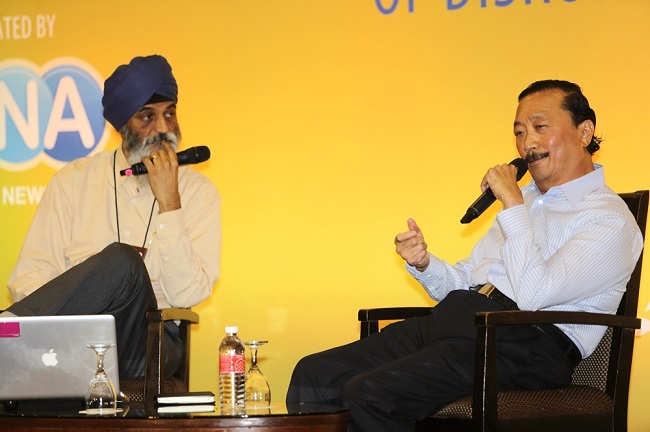Will commerce in SEA adopt a Bricks & Clicks model?
By Karamjit Singh December 2, 2016
- Online and offline merchants will have to figure out best strategy to win
- When a startup founder faces up to the reality of a rival executing better

IN A week where the KFit Group makes its second Groupon group acquisition, of Groupon Malaysia, and declares that it feels the Bricks & Clicks model or O2O (offline to online) is going to be the future of commerce in Southeast Asia (SEA), the publishers of a Malaysian focused e-commerce news site, ecommercemilo.com, published a book, in both soft copy and print, on the journeys of 10 e-commerce entrepreneurs.
I feel it is quite significant that an entrepreneur with the deep e-commerce exposure of Joel Neoh, KFIT founder and CEO, has concluded that it will be the hybrid model that is going to work best and be the way forward for commerce in SEA.
It was interesting that during my follow-on chat with Neoh (and I’ll publish that story on Monday), he didn’t say the future of e-commerce was going to be O2O. He just said the future of commerce was going to be this hybrid model. And that supports an opinion I heard from a small e-commerce merchant in Malaysia a few months ago who has moved from selling other brands online to building his own brand online with an eye to opening at least one physical store for enhanced visibility in a high traffic location.
As it is still early days for e-commerce in the region, it is still unclear whether this Bricks & Clicks model will favour the online or offline merchants, though at this stage I am leaning towards it favoring the brick and mortar merchants with established brands.
There’s going to be a lot of pain and experimentation for both sides as they try to figure this out and for the venture capitalists that fund the e-commerce space, here’s food for thought. Neoh won’t get into the physical part of e-commerce where the delivery of goods necessitates owning or outsourcing logistics capability specifically because this increases costs that have to be absorbed by the seller as consumers have been fed on expectations of free shipping.
Of course the delivery model will change and during DNA’s What’s Next conference in July, Old Economy tycoon Vincent Tan, founder and chairman of the Berjaya Corp Group shared that, in Malaysia, his chain of over 1,000 7-11 outlets will offer themselves as neighbourhood pick-up points for goods bought online. For a fee of course. So how will this change the economics of delivering goods bought online?
And as the latest VC to announce raising a new fund, in this case a US$100 million fund (RM445 million), it will be interesting to see if Singapore-based Jungle Ventures makes any of its planned Series A & B investments in the e-commerce space betting on pure play online companies where it plans to start by cutting US$3 million (RM13.3million) cheques.
The fund, which will focus mainly on SEA is yet more good news for startups in the region that have gained traction and are looking to raise their next round.
Finally, while Neoh is on to his second acquisition, one entrepreneur based in Kuala Lumpur has decided that she can best achieve her dreams by becoming part of another startup’s ambitions in the same space that has executed its regional plans faster than she had hoped to.
Lais de Oliveira, founder of 8Spaces has agreed to become part of Philippines based Fly Spaces, that operates a workplace marketplace that has quickly expanded to four countries within 12-months.
Oliveira had to face up to the reality that a competitor had put itself in a stronger regional position, quicker than she could do so and finding that their visions were aligned, she made the call to sell her business in an acqui-hire where Oliveira gets her stake in the business after completing three years with Fly Spaces.
I like this the message this deal sends out – that entrepreneurs have to be realistic about their business and if a competitor has done a better job than them, there is no shame or defeat in acknowledging that and producing a win-win situation where they bring their entrepreneurial flair to the other company with a small stake as incentive when they stay long enough to help build the company up.
With that, let me end my longer than usual weekly note and wish you a restful weekend and a productive week after.
Previous Instalments:
Week in Review: IDC pours cold water on Indonesia’s e-commerce market daydreams
Week In Review: Indonesia’s Future Potential Still a Siren Call
Week in Review: E-commerce not the panacea for Indonesia’s economic upliftment
Week in Review: It’s not easy to be a digital winner
Editor’s Picks:
Malaysian Telcos’ Q3 2016 report card: Who’s the winner?
Singapore leads in digital wallet usage
Revealing the hidden gems of Malaysian e-commerce
Amazon Web Services trains its spotlight on artificial intelligence
Review: Huawei MateBook, missing true greatness
Hyperlab aims to disrupt SEA market with chat app JustAsq
8Spaces CEO on being brave and following your vision, regardless of mentor advice
Tyre maker, Continental Malaysia prepares for Manufacturing 4.0


